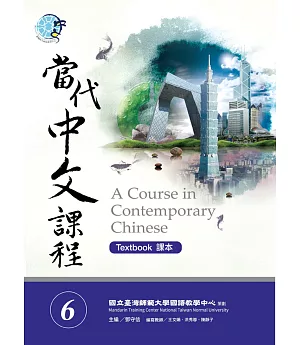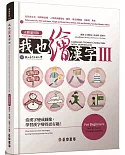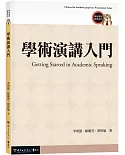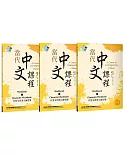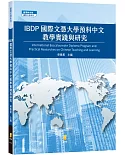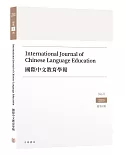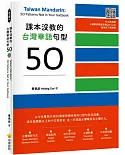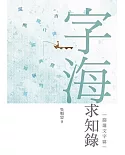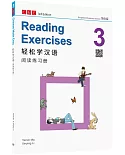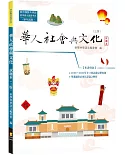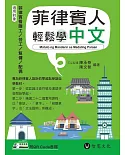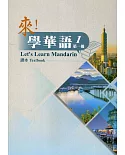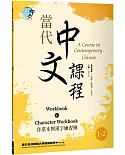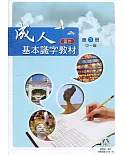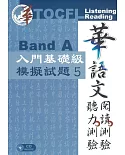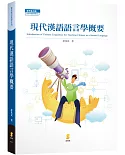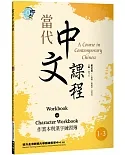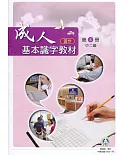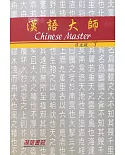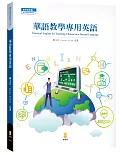華語教學最權威──國立臺灣師範大學國語教學中心 編寫開發
最符合當代華語學習趨勢的教學用書
讓中文課程走出新的未來、新的視野
系列規劃
全系列教材共六冊,為全方位訓練學生華語能力的教材。前三冊以口語訓練為主,後三冊開始進入書面語訓練。
第一冊著重在實際日常生活對話運用,第二冊開始輔以短文閱讀,第三冊則從長篇對話進入書面語及篇章的訓練,第四冊以篇章方式對書面語做更進一步的加強訓練,培養學生具備閱讀真實語料的語言實力。第五、六冊則涵蓋社會、科技、經濟、政治、文化、環境等多元議題探討,擴展學生對不同領域的語言運用。
各冊教材分別包含課本、作業本、教師手冊及漢字練習簿(第一、二冊)。
程度規劃
本系列教材適合來台學習華語學生,並適用於海外高中或大學學習華語的學生。一~六冊的程度規劃相當於 CEFR 的 A1-C1 等級或 ACTFL 的 Novice-Superior 等級。
本書特色
符合現代教學潮流,結合溝通式教學和任務導向學習,培養學生使用華語的能力。
每課開始的學習目標和課末的學習自評表,幫助學習者了解自己是否達成學習目標。
課文緊貼日常生活真實情況,使學生在自然的語境下學習華語。
採用新思維漢語教學詞類架構及語法說明,有效防堵學習者偏誤產生。
語法說明包括語法功能、結構、語用、練習四個部分,輔助學習者正確地使用語言。
課室活動提供明確的學習目標、活動或任務,透過有趣的活動練習鞏固學習。
「文化」單元輔以真實的照片,使學習者能深入瞭解臺灣當地社會文化。
提供線上輔助工具,協助教師課堂教學輔助及學習者之課後練習。
Introduction
This six-volume series is a comprehensive learning material that focuses on spoken language in the first three volumes and written language in the latter three volumes. Volume One aims to
strengthen daily conversation and applications; Volume Two contains short essays as supplementary readings; Volume Three introduces beginning-level written language and discourse, in addition
to extended dialogues. Volume Four uses discourse to solidify the learner’s written language and ability in reading authentic materials; Volumes Five and Six are arranged in topics such as
society, technology, economics, politics, culture, and environment to help the learner expand their language utilisations in different domains.
Each volume includes a textbook, a student workbook, and a teacher’s manual. In addition, Volume One and Two include a practice book for characters.
Level of Students
A Course in Contemporary Chinese 《當代中文課程》 is suitable for learners of Chinese in Taiwan, as well as for high school or college level Chinese language courses overseas. Volumes One to Six
cover levels A1 to C1 in the CEFR, or Novice to Superior levels in ACTFL Guidelines
Overview
The series adopts communicative language teaching and task-based learning to boost the learner’s Chinese ability.
Each lesson has learning objectives and self-evaluation to give the learner a clear record of tasks completed.
Lessons are authentic daily situations to help the learner learn in natural contexts.
Lexical items and syntactic structures are presented and explained in functional, not structural, perspectives.
Syntactic, i.e. grammatical, explanation includes functions, structures, pragmatics, and drills to guide the learner to proper usage.
Classroom activities have specific learning objectives, activities, or tasks to help fortify learning while having fun.
The “Bits of Chinese Culture” section of the lesson has authentic photographs to give the learner a deeper look at local Taiwanese culture.
Online access provides supplementary materials for teachers & students.
作者介紹
策劃者簡介
國立臺灣師範大學國語教學中心
成立於 1956 年,隸屬於國立臺灣師範大學,是臺灣歷史最悠久、規模最完備、教學最有成效的華語文教學機構。學員來自全世界各地,許多漢學界知名學者及政經界名人都曾在此就讀,在國際間享譽盛名。
The Mandarin Training Center (MTC) at NTNU
The Mandarin Training Center (MTC) is founded in 1956. The MTC, a subsidiary of National Taiwan Normal University (NTNU), is the largest and oldest institution dedicated to teaching Chinese as a second language in Taiwan. The center has well-equipped facilities and is internationally renowned for its high teaching quality. MTC’s students come from all over the world, and many renowned sinology scholars and important figures in the politics and financial are its alumni.
國立臺灣師範大學國語教學中心
成立於 1956 年,隸屬於國立臺灣師範大學,是臺灣歷史最悠久、規模最完備、教學最有成效的華語文教學機構。學員來自全世界各地,許多漢學界知名學者及政經界名人都曾在此就讀,在國際間享譽盛名。
The Mandarin Training Center (MTC) at NTNU
The Mandarin Training Center (MTC) is founded in 1956. The MTC, a subsidiary of National Taiwan Normal University (NTNU), is the largest and oldest institution dedicated to teaching Chinese as a second language in Taiwan. The center has well-equipped facilities and is internationally renowned for its high teaching quality. MTC’s students come from all over the world, and many renowned sinology scholars and important figures in the politics and financial are its alumni.
目錄
序 Foreword
主編的話 From the Editor’s Desk
系列規劃 About this Volume
漢語介紹 An Introduction to the Chinese Language
各課重點 Highlights of Lessons
詞類表 Parts of Speech in Chinese
第一課 職校教育
第二課 科技與生活
第三課 舞蹈藝術
第四課 做人心法
第五課 國際語言
第六課 貓熊角色
第七課 感情世界
第八課 奧運黑洞
第九課 鄉關何處
第十課 智慧與能力
附錄 Appendix
生詞索引 I. Vocabulary Index (Chinese-English)
生詞索引 II. Vocabulary Index (English-Chinese)
課文簡體字參考
主編的話 From the Editor’s Desk
系列規劃 About this Volume
漢語介紹 An Introduction to the Chinese Language
各課重點 Highlights of Lessons
詞類表 Parts of Speech in Chinese
第一課 職校教育
第二課 科技與生活
第三課 舞蹈藝術
第四課 做人心法
第五課 國際語言
第六課 貓熊角色
第七課 感情世界
第八課 奧運黑洞
第九課 鄉關何處
第十課 智慧與能力
附錄 Appendix
生詞索引 I. Vocabulary Index (Chinese-English)
生詞索引 II. Vocabulary Index (English-Chinese)
課文簡體字參考
序
序
本中心自1967 年開始編製教材,迄今編寫五十餘本,廣為台灣各語言中心使用。原使用之主教材《實用視聽華語》編輯至今近二十年,實須因應外在環境的變遷、教學法及教學媒體的創新與進步而新編教材,故籌畫編寫此系列教材《當代中文課程》。
本系列教材共六冊,最突出、不同於其他教材的地方是,將理論研究與實務教學的成果完美的結合在教材中。主編鄧守信博士本身是著名的語言學家,並有多年在美國實際教授外國學生學習漢語的課堂授課經驗,對於漢語語言以及華語教學語法的研究都有獨到之處。這套教材所採用的詞類系統能有效防堵學習者產生的偏誤;語法點的呈現則是一次只講一個語言形式,先說明功能,再擴展句式,最後提醒學習者使用時應注意的地方。與一般教材將類似形式放在一起,重形式操練,少功能介紹的方式不可同日而語。
這套教材預計今年(2018)底即將完成六冊的出版工作。從2012 年籌劃至今,這一路來除了特別要感謝主編的勞心勞力外,還要感謝我們18 位極富教學經驗的第一線教師願意在繁忙的教學之餘,積極參與這套教材的編寫工作。每冊初稿完成,為了廣納各方意見,我們很幸運地邀請到美國的Claudia Ross 教授、白建華教授及陳雅芬教授,擔任顧問;臺灣的葉德明教授、美國的姚道中教授、儲誠志教授及大陸的劉珣教授,擔任教材審查委員。每冊教材平均在本中心及臺灣其他語言中心,進行一年的試用;經過顧問的悉心指導、審查委員的仔細批閱,並集結授課教師及學生提出的寶貴意見,再由編寫教師做了多次修訂,才定稿付梓。對於在這整個過程中,努力不懈的編輯團隊―我們的執行編輯張莉萍副研究員、張黛琪老師及教材研發組成員蔡如珮、張雯雯,我要致上最高的謝意。
最後,特別感謝聯經出版事業股份有限公司,願意投注最大的心力,以專業的製作出版能力,協助我們將這套教材以最佳品質問世。我們希望,《當代中文課程》不只是提供學生們一套實用有效的教材,亦讓教師得到愉快充實的教學經驗。歡迎海內外教師在使用後,給予我們更多的指教與建議,讓我們不斷進步,也才能為華語文教學做出更大的貢獻。
國立臺灣師範大學國語教學中心主任
沈永正
Foreword
The Mandarin Training Center at National Taiwan Normal University has produced teaching materials since 1967, including over 50 publications used in language centers all across Taiwan. Our core teaching series Practical Audio-Visual Chinese has been in circulation for almost 20 years; however, in order to adapt to the changing cultural landscape and to advances in pedagogy and educational media, we are publishing a new learning series, A Course in Contemporary Chinese.
This exceptional six-volume series distinguishes itself from other teaching materials through its seamless integration of theoretical research findings and practical teaching expertise. The development of this new material has been led by Chief Editor Dr. Shou-hsin Teng, an esteemed linguist with many years of classroom experience in the United States teaching Chinese to foreign students, and whose research demonstrates unique insight into pedagogical grammar and the Chinese language.
Equipped with a unique parts-of-speech framework, this series will effectively prevent students from producing errors in communication. Whereas other teaching materials often present several related grammatical constructions at the same time and put emphasis on repetitive drills without clearly explaining the unique grammatical function of each construction, the grammar sections of our series present one construction at a time.
The description of its function is followed by example sentences and notes on the usage of each structure.
We hope that all six volumes of this series will be in publication before the end of 2018. I would like to express my deep gratitude to Chief Editor Teng, who has been dedicated to this project since initial preparations began in 2012, and to our team of eighteen seasoned educators who found the time outside of their busy teaching schedules to enthusiastically participate in the writing and editing process. The series has benefited from the invaluable feedback provided by our consultants in the United States, Professors Claudia Ross, Jian-hua Bai, and Yea-fen Chen, and review committee: Professors Teh-ming Ye (Taiwan), Tao-chung Yao (US), Cheng-zhi Chu (US), and Xun Liu (China).
Each volume of the series has already been in trial use at MTC and other language centers throughout Taiwan for roughly one year. Incorporating a wealth of feedback, from the thoughtful guidance of our consultants to the meticulous evaluations of our review committee to observations from instructors and students, the series has undergone multiple revisions before being sent to the press in its final form. Over the course of this entire process, our editorial team has worked tirelessly and I would like to express my sincere gratitude to them: Associate Research Fellow Liping Chang, Tai-chi Chang, and Ru-pei Cai and Wen-wen Chang from the MTC division of teaching material development.
Lastly, I would like to thank Linking Publishing Company for their professionalism and whole-hearted commitment to ensuring that this series be published with the greatest possible quality. It is our hope that A Course in Contemporary Chinese will not only serve as an effective, useful resource for students, but also will facilitate an enjoyable, enriching teaching experience for instructors. We invite instructors in Taiwan and abroad who use this series in class to send us comments and/or suggestions so that we can continue to improve the Course and thus make an even greater contribution to the teaching of Chinese as a foreign language.
Yung-cheng Shen
May 4th, 2018
Director, Mandarin Training Center
National Taiwan Normal University
主編的話
From the Editor’s Desk
Finally, after more than two years, volume one of our six-volume project is seeing the light of day. The language used in A Course in Contemporary Chinese is up to date, and though there persists a deep ‘generation gap’ between it and my own brand of Chinese, this is as it should be. In addition to myself, our project team has consisted of 18 veteran MTC teachers and the entire staff of the MTC Section of Instructional Materials, plus the MTC Deputy Director.
The field of L2 Chinese in Taiwan seems to have adopted the world-famous ’one child policy’. The complete set of currently used textbooks was born a generation ago, and until now has been without predecessor. We are happy to fill this vacancy, and with the title ‘number two’, yet we also aspire to have it be number two in name alone. After a generation, we present a slightly disciplined contemporary language as observed in Taiwan, we employ Hanyu Pinyin without having to justify it cautiously and timidly, we are proud to present a brand-new system of Chinese parts of speech that will hopefully eliminate many instances of error, we have devised two kinds of exercises in our series, one basically structural and the other entirely task-based, each serving its own intended function, and finally we have included in each lesson a special aspect of Chinese culture. Moreover, all this is done in full color, the first time ever in the field of L2 Chinese in Taiwan. The settings for our current series is in Taipei, Taiwan, with events taking place near the National Taiwan Normal University. The six volumes progress from basic colloquial to semi-formal and finally to authentic conversations or narratives. The glossary in vocabulary and grammar is in basically semi-literal English, not free translation, as we wish to guide the readers/learners along the Chinese ’ways of thinking’, but rest assured that no pidgin English has been used.
I am a functional, not structural, linguist, and users of our new textbooks will find our approaches and explanations more down to earth. Both teachers and learners will find that the content resonates with their own experiences and feelings. Rote learning plays but a tiny part of our learning experiences. In a functional frame, the role of the speaker is often seen as prominent. This is natural, as numerous adverbs in Chinese, as they are traditionally referred to, do not in fact modify verb phrases at all. They relate to the speaker.
We, the field of Chinese as a second language, know a lot about how to teach, especially when it comes to Chinese characters. Most L2 Chinese teachers world-wide are ethnically Chinese, and teach characters just as they were taught in childhood. Truth is, we know next to nothing how adult students/learners actually learn characters, and other elements of the Chinese language. While we have nothing new in this series of textbooks that contributes to the teaching of Chinese characters, I tried to tightly integrate teaching and learning through our presentation of vocabulary items and grammatical structures. Underneath such methodologies is my personal conviction, and at times both instructors’ and learners’ patience is requested. I welcome communication with all users of our new textbooks, whether instructors or students/learners.
Shou-hsin Teng
本中心自1967 年開始編製教材,迄今編寫五十餘本,廣為台灣各語言中心使用。原使用之主教材《實用視聽華語》編輯至今近二十年,實須因應外在環境的變遷、教學法及教學媒體的創新與進步而新編教材,故籌畫編寫此系列教材《當代中文課程》。
本系列教材共六冊,最突出、不同於其他教材的地方是,將理論研究與實務教學的成果完美的結合在教材中。主編鄧守信博士本身是著名的語言學家,並有多年在美國實際教授外國學生學習漢語的課堂授課經驗,對於漢語語言以及華語教學語法的研究都有獨到之處。這套教材所採用的詞類系統能有效防堵學習者產生的偏誤;語法點的呈現則是一次只講一個語言形式,先說明功能,再擴展句式,最後提醒學習者使用時應注意的地方。與一般教材將類似形式放在一起,重形式操練,少功能介紹的方式不可同日而語。
這套教材預計今年(2018)底即將完成六冊的出版工作。從2012 年籌劃至今,這一路來除了特別要感謝主編的勞心勞力外,還要感謝我們18 位極富教學經驗的第一線教師願意在繁忙的教學之餘,積極參與這套教材的編寫工作。每冊初稿完成,為了廣納各方意見,我們很幸運地邀請到美國的Claudia Ross 教授、白建華教授及陳雅芬教授,擔任顧問;臺灣的葉德明教授、美國的姚道中教授、儲誠志教授及大陸的劉珣教授,擔任教材審查委員。每冊教材平均在本中心及臺灣其他語言中心,進行一年的試用;經過顧問的悉心指導、審查委員的仔細批閱,並集結授課教師及學生提出的寶貴意見,再由編寫教師做了多次修訂,才定稿付梓。對於在這整個過程中,努力不懈的編輯團隊―我們的執行編輯張莉萍副研究員、張黛琪老師及教材研發組成員蔡如珮、張雯雯,我要致上最高的謝意。
最後,特別感謝聯經出版事業股份有限公司,願意投注最大的心力,以專業的製作出版能力,協助我們將這套教材以最佳品質問世。我們希望,《當代中文課程》不只是提供學生們一套實用有效的教材,亦讓教師得到愉快充實的教學經驗。歡迎海內外教師在使用後,給予我們更多的指教與建議,讓我們不斷進步,也才能為華語文教學做出更大的貢獻。
國立臺灣師範大學國語教學中心主任
沈永正
Foreword
The Mandarin Training Center at National Taiwan Normal University has produced teaching materials since 1967, including over 50 publications used in language centers all across Taiwan. Our core teaching series Practical Audio-Visual Chinese has been in circulation for almost 20 years; however, in order to adapt to the changing cultural landscape and to advances in pedagogy and educational media, we are publishing a new learning series, A Course in Contemporary Chinese.
This exceptional six-volume series distinguishes itself from other teaching materials through its seamless integration of theoretical research findings and practical teaching expertise. The development of this new material has been led by Chief Editor Dr. Shou-hsin Teng, an esteemed linguist with many years of classroom experience in the United States teaching Chinese to foreign students, and whose research demonstrates unique insight into pedagogical grammar and the Chinese language.
Equipped with a unique parts-of-speech framework, this series will effectively prevent students from producing errors in communication. Whereas other teaching materials often present several related grammatical constructions at the same time and put emphasis on repetitive drills without clearly explaining the unique grammatical function of each construction, the grammar sections of our series present one construction at a time.
The description of its function is followed by example sentences and notes on the usage of each structure.
We hope that all six volumes of this series will be in publication before the end of 2018. I would like to express my deep gratitude to Chief Editor Teng, who has been dedicated to this project since initial preparations began in 2012, and to our team of eighteen seasoned educators who found the time outside of their busy teaching schedules to enthusiastically participate in the writing and editing process. The series has benefited from the invaluable feedback provided by our consultants in the United States, Professors Claudia Ross, Jian-hua Bai, and Yea-fen Chen, and review committee: Professors Teh-ming Ye (Taiwan), Tao-chung Yao (US), Cheng-zhi Chu (US), and Xun Liu (China).
Each volume of the series has already been in trial use at MTC and other language centers throughout Taiwan for roughly one year. Incorporating a wealth of feedback, from the thoughtful guidance of our consultants to the meticulous evaluations of our review committee to observations from instructors and students, the series has undergone multiple revisions before being sent to the press in its final form. Over the course of this entire process, our editorial team has worked tirelessly and I would like to express my sincere gratitude to them: Associate Research Fellow Liping Chang, Tai-chi Chang, and Ru-pei Cai and Wen-wen Chang from the MTC division of teaching material development.
Lastly, I would like to thank Linking Publishing Company for their professionalism and whole-hearted commitment to ensuring that this series be published with the greatest possible quality. It is our hope that A Course in Contemporary Chinese will not only serve as an effective, useful resource for students, but also will facilitate an enjoyable, enriching teaching experience for instructors. We invite instructors in Taiwan and abroad who use this series in class to send us comments and/or suggestions so that we can continue to improve the Course and thus make an even greater contribution to the teaching of Chinese as a foreign language.
Yung-cheng Shen
May 4th, 2018
Director, Mandarin Training Center
National Taiwan Normal University
主編的話
From the Editor’s Desk
Finally, after more than two years, volume one of our six-volume project is seeing the light of day. The language used in A Course in Contemporary Chinese is up to date, and though there persists a deep ‘generation gap’ between it and my own brand of Chinese, this is as it should be. In addition to myself, our project team has consisted of 18 veteran MTC teachers and the entire staff of the MTC Section of Instructional Materials, plus the MTC Deputy Director.
The field of L2 Chinese in Taiwan seems to have adopted the world-famous ’one child policy’. The complete set of currently used textbooks was born a generation ago, and until now has been without predecessor. We are happy to fill this vacancy, and with the title ‘number two’, yet we also aspire to have it be number two in name alone. After a generation, we present a slightly disciplined contemporary language as observed in Taiwan, we employ Hanyu Pinyin without having to justify it cautiously and timidly, we are proud to present a brand-new system of Chinese parts of speech that will hopefully eliminate many instances of error, we have devised two kinds of exercises in our series, one basically structural and the other entirely task-based, each serving its own intended function, and finally we have included in each lesson a special aspect of Chinese culture. Moreover, all this is done in full color, the first time ever in the field of L2 Chinese in Taiwan. The settings for our current series is in Taipei, Taiwan, with events taking place near the National Taiwan Normal University. The six volumes progress from basic colloquial to semi-formal and finally to authentic conversations or narratives. The glossary in vocabulary and grammar is in basically semi-literal English, not free translation, as we wish to guide the readers/learners along the Chinese ’ways of thinking’, but rest assured that no pidgin English has been used.
I am a functional, not structural, linguist, and users of our new textbooks will find our approaches and explanations more down to earth. Both teachers and learners will find that the content resonates with their own experiences and feelings. Rote learning plays but a tiny part of our learning experiences. In a functional frame, the role of the speaker is often seen as prominent. This is natural, as numerous adverbs in Chinese, as they are traditionally referred to, do not in fact modify verb phrases at all. They relate to the speaker.
We, the field of Chinese as a second language, know a lot about how to teach, especially when it comes to Chinese characters. Most L2 Chinese teachers world-wide are ethnically Chinese, and teach characters just as they were taught in childhood. Truth is, we know next to nothing how adult students/learners actually learn characters, and other elements of the Chinese language. While we have nothing new in this series of textbooks that contributes to the teaching of Chinese characters, I tried to tightly integrate teaching and learning through our presentation of vocabulary items and grammatical structures. Underneath such methodologies is my personal conviction, and at times both instructors’ and learners’ patience is requested. I welcome communication with all users of our new textbooks, whether instructors or students/learners.
Shou-hsin Teng
網路書店
類別
折扣
價格
-
電子書52折$520
-
新書68折$680
-
新書79折$790
-
新書79折$790
-
新書79折$790
-
新書79折$790
-
新書85折$850
-
新書88折$880
-
新書9折$900

